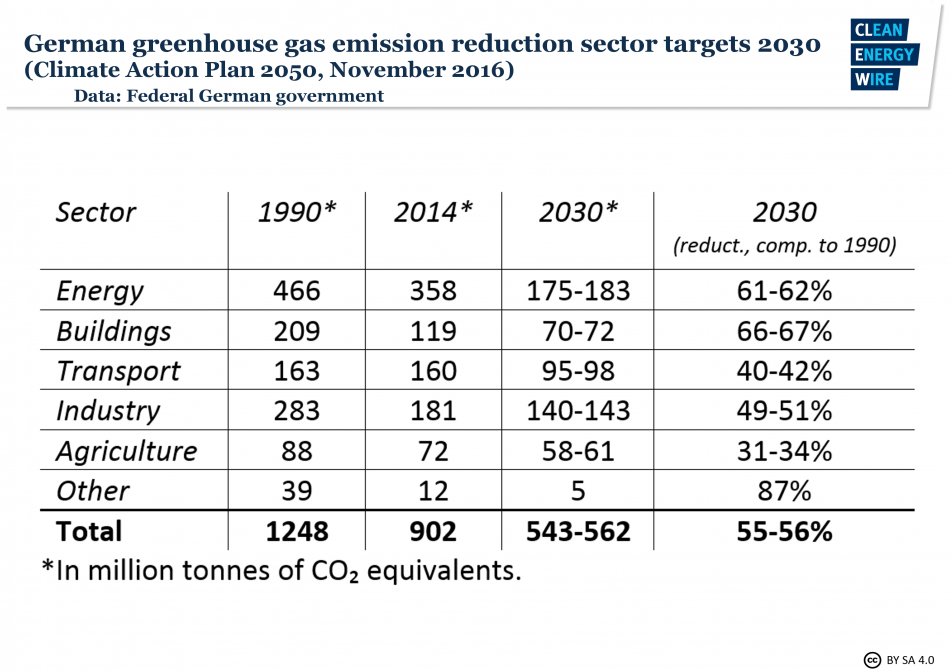NGOs warn govt that tight housing market no excuse to neglect climate
Germany’s standstill in efforts to make housing more climate-friendly is “alarming” and the government shows no inclination to change course, according to an alliance of efficiency and environmental organisations.
“If we continue on the current path, we will never reach the climate targets,” said Barbara Metz, vice head of Environmental Action Germany (DUH), at a joint press conference with several efficiency industry associations that was timed to coincide with the government’s prominent “housing summit”. The alliance expressed outrage over the fact that there was no adequate discussion about energy consumption in buildings at the summit.
Chancellor Angela Merkel and interior minister Horst Seehofer, who is also in charge of construction, hosted representatives of federal states, municipalities, the housing and real estate industry, tenants and unions to discuss the necessary steps to ensure that 1.5 million “affordable” flats and houses will be built during the current legislative period to ease rising tensions on the housing market. Housing prices in Germany have soared in recent years and the issue of affordable housing is increasingly preoccupying voters.
Efficiency standards did not play a role in a press conference following the summit in the German chancellery. However, according to a position paper released after the meeting, the federal government is committed to the national, European and Paris Agreement climate targets, as well as to affordable housing. “Affordable construction and housing, energy efficiency and climate protection must not be played off against each other,” says the paper. It adds that the current energy standards will remain in effect for existing and new buildings.
Following the introduction of both the coal exit commission and the mobility transition platform, the federal government will also set up a task force for the building sector.
The efficiency proponents said the summit is only the latest example in a long line of opportunities the government missed to show that it is serious about climate action.
More than a third of the energy Germany uses is consumed in the housing sector. The energy transition pioneer aims to reduce emissions in the sector by around a third from current levels, and make it entirely climate-neutral by 2050. Because Germany is likely to miss its 2020 climate targets by a wide margin, the government has set its eyes on 2030 targets. [Find plenty of background on efficiency in the dossier Taming the appetite for energy]
The NGOs said Germany must renovate at least three percent of its buildings per year to achieve those targets – a sharp contrast to the current rate of 0.8 percent.
Government proposes even lower standards
“The targets are likely to be missed,” said Christian Noll, chairman of the German Industry Initiative for Energy Efficiency (DENEFF). He said renovation incentives aimed at landlords and homeowners were urgently needed, and called on the government to lead by example by renovating its own buildings. “But absolutely nothing is happening in this regard.”
The Federation of German Industries (BDI) also said current government proposals to even lower certain incentives for modernisations run counter to a meaningful climate policy. “It is completely implausible to demand the highest climate policy ambitions and then not only to refuse necessary incentives such as tax cuts, but even to actively complicate climate protection in a central area such as building efficiency,” said BDI executive board member Holger Lösch in an emailed statement.
“Housing gets ever more expensive and scarce – we’re headed for London conditions,” said Barbara Metz, vice head of Environmental Action Germany (DUH). “The aim of the housing summit is to soothe excited minds, especially with a view to state elections in Bavaria,” she added with a view to the regional vote on 14 October.
“The message is: Climate protection is too expensive. But this is simply not true,” Metz said in response to criticisms that high efficiency standards will push up costs further, adding the rapid increase in construction and housing costs was mainly caused by high demand, low interest rates, higher land prices, and the shortage of skilled labour.
Minimum energy performance standards for rental buildings can be an important instrument for combating energy poverty because they lower energy bills, according to a paper published this week by the Buildings Performance Institute Europe (BPIE) and the Regulatory Assistance Project (RAP)


